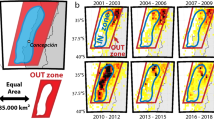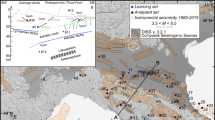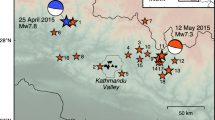Abstract
As it is unusual for the Kew magnetographs to be affected by earthquakes, it seems worth mentioning that on the occasion of the Turkestan earthquake, near midnight (G.M.T.) of January 3, both the declination and horizontal force traces show unmistakable effects. The magnets oscillated in a way characteristic of mechanical shocks. According to our Milne seismograph, the preliminary seismic tremors reached Kew about 11.35 p.m., and the large waves about 11.47 p.m., when the limits of registration were exceeded for a minute or so. There was then a comparative lull until about 11.54, when the limits of registration were again exceeded, and these very large movements continued with short interludes for more than fifteen minutes.
This is a preview of subscription content, access via your institution
Access options
Subscribe to this journal
Receive 51 print issues and online access
$199.00 per year
only $3.90 per issue
Buy this article
- Purchase on Springer Link
- Instant access to full article PDF
Prices may be subject to local taxes which are calculated during checkout
Similar content being viewed by others
Author information
Authors and Affiliations
Rights and permissions
About this article
Cite this article
CHREE, C. The Recent Earthquakes in Asia. Nature 85, 335–336 (1911). https://doi.org/10.1038/085335g0
Issue Date:
DOI: https://doi.org/10.1038/085335g0
Comments
By submitting a comment you agree to abide by our Terms and Community Guidelines. If you find something abusive or that does not comply with our terms or guidelines please flag it as inappropriate.



